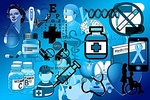Blood tests are one of the most important diagnostic techniques available to physicians. There’s so much that a small sample of blood can tell a doctor that you’ll likely need to get your blood tested if they suspect that something is wrong with your health.
[su_list icon=”icon: check-circle”]
So, a blood test can assess:
- Your general health and fitness
- Whether you have an infection of not
- How well your liver, kidneys or lungs are working
- Whether you have a disease or a genetic medical condition
- Whether you have allergies like celiac disease, high cholesterol or low glucose
They can even diagnose thyroid conditions, certain kinds of cancer and more. Their wide use is why doctors often take blood tests during regular health check-ups. But, as you may know, you can’t go for a blood test straight away. You have to prepare.
What to Do before a Blood Test
When your doctor told you that you needed a blood test, they should tell you exactly what to do and what not to do. Unfortunately, because of time pressure and the fact that there’s a lot to take in, it’s easy to forget exactly what was said.
1) Can You Eat Before a Blood Test?
Make sure you don’t eat before your test. This is true for the majority of blood tests, which are called ‘fasting blood tests.’ Your doctor should have told you not to eat anything in the hours leading up to your test—normally between eight and twelve hours.
That being said, you don’t have to fast before every kind of blood test. From the list of blood tests, these are the most common you would need to fast for:
- Blood glucose test. It’s important to fast before a glucose blood test because some people metabolize glucose quickly. If that’s the case, then something as simple as taking a bite of chocolate an hour before your blood test can completely change the results. Since a blood glucose test tests for diabetes, it’s vital not to affect the results too much.
- Blood cholesterol test. The point of this test is to identify the general level of cholesterol in your blood. Cholesterol tends to remain in the bloodstream for a long time. But, just like glucose, eating something high in fat before your test can significantly alter your results.

However, any blood test designed to measure infections won’t be affected. If your blood test measures hepatitis B or C, for example, there’s no need to fast. That’s because the infection will be present whether you eat before the test or not. In fact, if fasting isn’t required, it’s best that you eat more than you usually would before your test. That can keep your blood sugar levels high, which helps you recover afterward.
If you’re unsure whether to fast or not, ask your doctor, and they can tell you.
2) Can You Drink Water Before a Blood Test?
Can you drink water while fasting for a blood test? Long story short, yes, you can. Having a slightly higher or lower level of water in your system doesn’t make a difference to blood tests. Blood tests aren’t like surgery, which requires you to avoid eating or drinking entirely. Either tap water or bottled water is fine, although you should avoid carbonated drinks.
Drinking more water than usual is quite important for anybody who might not like blood tests. Why? As low blood pressure—a side effect of dehydration—causes dizziness and fainting. If you’re prone to fainting at the sight of blood or needles, staying hydrated can help.
However, doctors recommend that you only drink water and nothing else. This is because other drinks can most certainly affect the results of your test. Diuretics are an excellent example. Diuretics make your pass more water, more often. This can affect the results of a blood test that’s designed to measure kidney function.
Alcohol is another diuretic, but it also affects blood tests in other ways. You may, in fact, be required not to drink at all for at least 24 hours before the test. This is because tests that assess liver health may be skewed by alcohol remaining in the bloodstream.
3) Can You Take Medication Before a Blood Test?
Again, whether you take medication or not before a blood test depends on the exact test you’re having. Certain medications can affect the outcome of a test. But that might be less important than the medication’s continued effects. Your doctor will balance these two concerns and tell you what to do, either way.
Steroids are an excellent example. They can increase the level of cholesterol in your bloodstream. But if it’s important that you keep taking them, your doctor will bear that in mind. All they’ll do is make a note of it when they interpret your results.
One particular gray area is if you’re taking herbal remedies. Vitamins and supplements can also have unintended effects on your test, so it’s best that you stop taking them. If you do take supplements or medication, take it with you to your blood test. You can show it to your phlebotomist (the person who draws the blood for the test). They’ll make a note of what you take for the doctor to see.
Above all, remember the rule: don’t stop taking prescribed medication unless your physician tells you. Your doctor has access to all your medical records. Plus, if they’re your family doctor, they’ll be entirely familiar with any medication you’re taking. If they knew that the medication was contraindicated against your blood test, they would have told you. If you’re unsure, just ask.
4) Keep Yourself Warm
Something that you might not know is that keeping yourself warm can greatly help before a blood test. Unlike the other points on this list, it’s not because keeping warm affects the composition of your blood. But it does affect the blood—warmth improves blood flow to certain parts of your body.
The point is that the more blood in an area, the easier it is for your phlebotomist to find a good vein. It’s an unfortunately common experience: sometimes the person drawing blood can’t find a vein. They have to repeatedly inject the needle until they find the right spot. This can be painful, make you feel mentally uncomfortable, and can cause a fear of needles.
Keeping yourself warm avoids this problem. There are two easy ways to keep your arms warm before a test. You could either wear clothing that’s thick, no matter the time of year. This keeps your whole body warm. If that doesn’t sound appealing, try a warm compress. Apply it directly to your inner arm.
5) Ask Your Doctors for Instructions
If you have any doubts at all about your blood test, talk to your doctor. They can advise you further on whether you need to fast, whether you need to take any special precautions with medications or prepare in any other way. Your doctor may make specific recommendations depending on the test. See section 6 for more details.
However, don’t just talk to your family doctor. Talk to your phlebotomist too. A phlebotomist is a person specifically trained in drawing blood from patients in a clinical setting. Phlebotomists work in hospitals, specialist clinics or research. You will meet your phlebotomist when you go through your test.
They have a wealth of experience that you can draw from, and can advise you on:
- How to go through a blood test if you’re scared of needles
- Whether your vitamins, supplements or medications will adversely affect the result of your test
- Whether you’re likely to need more than one test
This can help you get through the test itself, and help you manage your expectations afterward. Their advice can help you get through the process of having blood drawn much easier. All you have to do is ask.
6) Preparation for Specific Tests
Some tests have specific requirements, and some circumstances change the requirements before a test. Here are the most common things you need to know:
- What not to do before a PSA blood test (prostate cancer test): you have to avoid sexual activity that involves ejaculation for 48 hours before the test.
- If you are taking a female hormone test, the results will change depending on when the test is taken. Talk with your doctor about your menstruation cycle so that they know when to test.
- You cannot have a blood test soon after an ultrasound test, physiotherapy or a roentgenologic test.
If there was something specific you had to do, your doctor should have told you already. However, to put your mind at ease, contact your healthcare professional.
Why Is Preparing So Important?
Your doctor’s recommendations are for your good. They make your experience much less stressful, they make your phlebotomist’s job easier, and they make the test much more accurate. So, while it might be tempting to drink a little coffee or alcohol, don’t; and don’t have breakfast if you need to fast.

Bear in mind that though your doctor can account for factors that affect the test, they aren’t mind-readers. If you couldn’t help but grab a coffee that morning, let them know. That way, even though the test might not be completely accurate, at least your honesty helps them—and you.
What If I’m Scared of Needles?
A fear of needles, also known as ‘needle phobia,’ is very common. Around 10% of Americans experience the same fear, and it often stems from blood tests at a young age. It can often manifest as a fear of pointy objects generally. While this isn’t too debilitating in everyday life, it makes medical testing awkward and stressful.
However, there are plenty of ways that you can navigate your way around a fear of needles. It needn’t stop you from having a blood test done. Contrary to what you might think, a blood test doesn’t need to be painful or stressful. Even if you normally do, you won’t pass out or become anxious if the procedure is managed properly. Let’s take a look at a few ways that you can work around a fear of needles.
Ask About Local Anesthetic
If the pain of an injection is what you’re afraid of, then local anesthetic can help. A local anesthetic numbs the area that it’s applied to, unlike general anesthetic, which knocks you out cold. Certain anesthetics are strong enough that they can penetrate deep below the skin. These kinds make blood tests entirely painless.
One common anesthetic is EMLA, a mixture of lidocaine and prilocaine. EMLA is a prescription cream that the doctor will rub on the surface of your skin. It is much stronger than numbing creams that you can get over the counter. If you use it, all you’ll have to do it look away—you won’t feel a thing.
If EMLA isn’t available, you do have other options. Iontophoresis is a method of anesthesia which involves an electric current. It uses similar chemical substances, but the anesthetic is spread by use of the current. It acts quickly and effectively but isn’t widely available. Lidocaine patches like Synera are common, though, and should be available.
A local anesthetic is normally available on insurance, while general anesthetic is not.
Manage Your Stress
Stress management is incredibly important if you have a fear of needles. It can be the difference between getting through the procedure comfortably, or not being able to have your blood drawn at all. Fortunately, it’s easy to manage your stress all on your own.
Consider trying the following methods:
- Take control of your breathing. Breath in through your nose and out through your mouth, slowly and gently. Focusing on the process of breathing in a cycle like this one can stop your mind from wandering. It also holds panic attacks at bay, which are characterized by short/sharp breaths.
- Meditate on a phrase. Buddhist meditation typically involves repetition of a sound or phrase. Again, this can help to focus the mind. With your mind focused on something other than needles, you’ll find it much easier to get through the test.
- Learn more about blood tests. Knowledge is power, and the more understanding you have, the less you can worry. A fear of needles can lead to a vicious circle: the fear may mean that you never go through a blood test, which you consequently never learn about the experience. That lack of experience, a fear of the unknown, can make a blood test seem even scarier. Learn more about what happens during a blood test to overcome your fear.
- Adopt a positive mental attitude. A positive mental attitude is simple: tell yourself that you can handle a blood test, no matter what happens. Ask yourself, “What’s the worst that could happen?” Remind yourself that it’ll be over within a few minutes. Simply adopting a positive viewpoint can make the test much less stressful.

It is also possible to manage stress using medication. Medication isn’t necessary if you can learn how to manage stress yourself. If you have been diagnosed with an anxiety disorder, however, it might be your best option.
Therapy
If you only need one blood test, then therapy—of course—isn’t necessary. But if you need regular blood tests or regular injections for a condition like diabetes, then therapy could help. The point is to help you feel stronger and more capable of tackling your fear. Contrary to popular belief, ‘therapy’ is not just sitting on a couch and talking about your problems. There are several methods and ones that work for some but not others. In no particular order:
- Cognitive behavioral therapy is a specific kind of therapy which involves managing the way you think and behave. The therapist helps you to understand how your thoughts affect both your feelings and your actions. Since you can control the way that you think, CBT can, therefore, make you feel better. It’s commonly used for tackling the feelings of anxiety related to phobias.
- Exposure therapy is exactly what it sounds like. Your therapist gradually introduces you to something that you’re afraid of. This could be anything that causes a phobia: the outdoors, clowns, doctors or needles. The therapy takes place in a controlled and safe setting, one in which you’re comfortable.
That being said, there’s little point going through the time and effort of therapy for one blood test. But as we mentioned above, if you need regular blood tests, therapy could be for you.
Distract Yourself
Do you feel nervous in the run-up to your blood test, no matter how much you prepare? If so, your best option is to distract yourself. There’s no shame in simply training your attention on something else. Don’t allow yourself to hyper-focus on the idea of needles or pain. Simply distract yourself, with something like:
- Watching movies or TV, or listening to the radio
- Going out of an evening and doing something fun
- Talking with people about things other than needles and blood tests
- Spending extra time on your hobbies before your test
By distracting yourself, you can while away the time before the test. A big part of a fear of needles is the anticipation. You sit and think: worrying about what could go wrong. By the time the actual test rolls around, you’ve made the test a bigger problem than it needs to be. Distracting yourself with something fun can help you avoid that issue.
What If Blood Test Results are Bad?
Part of your fear might hinge on the idea that your results will be negative. You might find out that there’s something wrong; something serious like cancer or diabetes. This is a completely understandable worry, but avoiding a blood test is an irrational decision. It’s much better to get the test out of the way and find out if there’s a problem.
That being said, it’s best to be prepared. Bad blood test results may indicate:
- PSA/prostate cancer
- Diabetes
- Anemia
- Liver problems
You can expect the results of your blood test about 24 hours after the test is taken. However, in certain cases, it can take days or weeks. The results are sent directly back to your healthcare provider, who will then call you in to talk. They can then either break bad news or share the good news, depending on the results.
If you’ve read this far, you’re probably thinking: “How on earth can I do all of that? There’s so much to do that I don’t know where to start!” It’s understandable. But by far the best advice you can take is that of your doctor.
Think back: what did they tell you to do in preparation for your test? If you’re not sure, make a quick call to ask and find out. They’ll be able to tell you if there are any special requirements. The best thing to do is to take precautions anyway: fast for at least eight hours before your test, drink ample water and avoid stimulating or diuretic drinks.
[/su_list]



